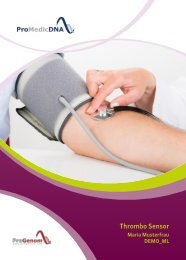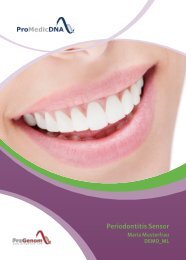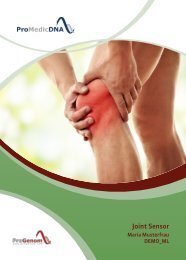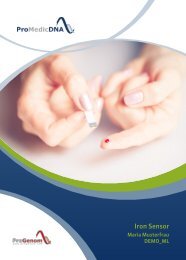ProVitalDNA - Package - DEMO EN
non-medical analysis - ProVitalDNA
non-medical analysis - ProVitalDNA
You also want an ePaper? Increase the reach of your titles
YUMPU automatically turns print PDFs into web optimized ePapers that Google loves.
Sucrose<br />
This sugar contains calories and can have a negative<br />
impact on certain genetic types in terms of<br />
cognitive health and blood sugar regulation.<br />
Selenium<br />
Selenium is an important component of many<br />
enzymes, some of which can neutralize free<br />
radicals. Certain genetic types need higher amounts<br />
of selenium to increase antioxidant protection.<br />
Zinc is needed by the body to correctly metabolize<br />
macronutrients, to properly construct proteins, to<br />
maintain normal bone and to create new DNA. It is<br />
an essential micronutrient as an essential part of<br />
many proteins and enzymes.<br />
ß-carotene and vitamin A<br />
These vitamins and substances are contained<br />
within coloured vegetables and can aid certain<br />
genetic types in detoxification, protection from<br />
free radicals and cognitive health.<br />
Vitamin C, E and zinc<br />
These substances are strong antioxidants and can<br />
have a positive impact on cognitive health, eye<br />
health, joint health and protection from free<br />
radicals.<br />
Vitamin D<br />
This vitamin can be produced by the skin in sunlight<br />
and is an important factor for healthy bones.<br />
Certain genetic types require higher doses of this<br />
vitamin to maintain optimal bone health.<br />
Unsaturated fatty acids (group)<br />
This term describes all unsaturated fatty acids,<br />
which are generally considered the "healthy fats".<br />
Omega 3 fatty acids<br />
This general term describes all omega 3 fatty acids<br />
(of which there are several types), which can be<br />
found in fish and fish oils as well as some plants.<br />
They have a positive impact on joint health, but can<br />
lead to a negative impact on HDL cholesterol in<br />
some genetic types.<br />
Alpha linolenic acid<br />
Alpha linolenic acid is important for the conversion<br />
of omega 3 fatty acids and has a positive effect on<br />
joint health. On the other hand, this substance can<br />
have a negative impact on cholesterol levels in<br />
certain genetic types.<br />
Docosahexaenoic acid (DHA) and<br />
Eicosapentaenoic acid (EPA)<br />
These omega 3 fatty acids are important for the<br />
regulation of the cholesterol levels and the correct<br />
function of the immune system, joints and the<br />
brain. Some genetic types do however experience a<br />
negative effect on the HDL cholesterol levels, which<br />
needs to be considered.<br />
Zinc<br />
<strong>DEMO</strong>_ML Page 101 of 295


















